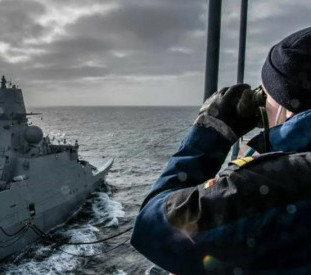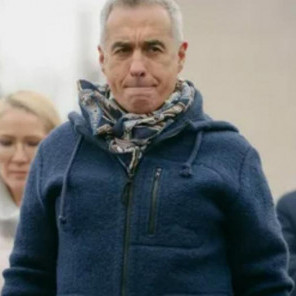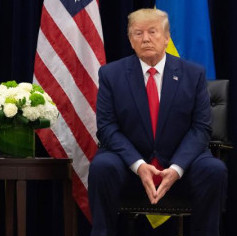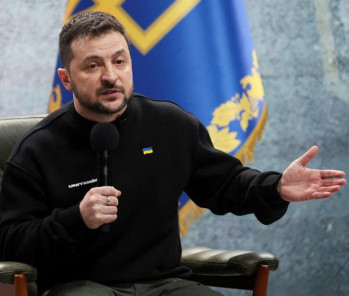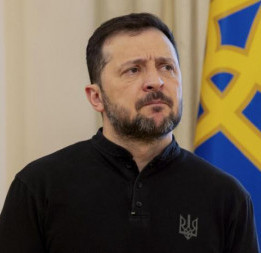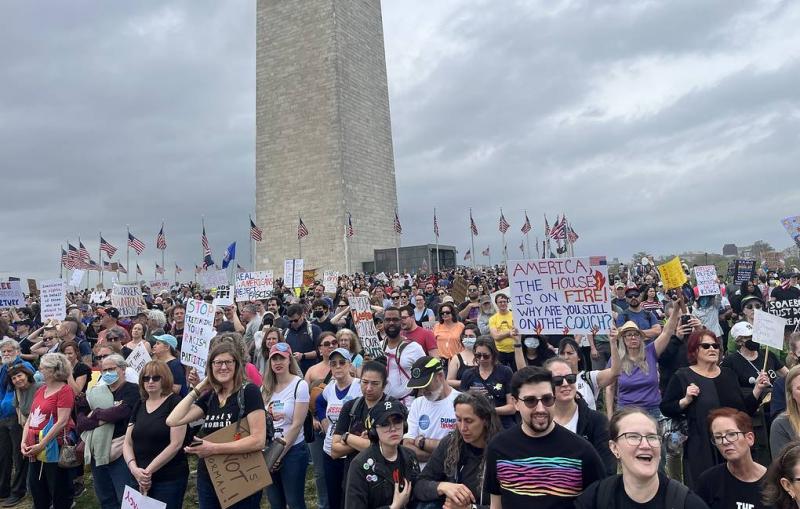
Widespread protests erupted across the US against President Trump’s policies and his ally Elon Musk; the OSCE Parliamentary Assembly is deliberating Russia’s return; and Russia’s participation in the LAAD 2025 arms exhibition in Brazil indicates a renewed interest in the Latin American defense market. These stories topped Monday’s newspaper headlines across Russia, according to TASS News Agency.
Vedomosti: US sees first large-scale protests since Trump’s return to White House
The United States witnessed its first wave of large-scale protests since Donald Trump returned to the White House, with more than 1,400 demonstrations against the policies of the president and his ally, billionaire Elon Musk, taking place across all 50 states on April 5. According to CNN, approximately 600,000 people participated in the rallies, which became the largest nationwide demonstration since Trump resumed the presidency. According to experts interviewed by Vedomosti, the protests may mark the beginning of a broader Democratic strategy to undermine Republican governance.
Ahead of the protests, organizers issued three key demands to Trump: to end what they described as a "billionaires’ power grab," to halt cuts to federal funding for social programs and Medicaid, and to refrain from attacks on minority groups. Protesters also expressed opposition to the dismissal of tens of thousands of federal employees and the closure of federal agencies.
These current demonstrations serve as a test run ahead of more widespread protests, Senior Research Fellow at the Institute for US and Canadian Studies of the Russian Academy of Sciences Vladimir Vasilyev told Vedomosti. The political honeymoon period of the newly elected president has come to an end, and Democrats are now mobilizing civil society in an effort to paralyze the work of Republicans in government, the expert suggested, he believes.
Another setback for Democrats has been the effective suspension of USAID operations, Vasilyev added. According to the expert, USAID’s funds functioned as an unofficial slush fund for the Democratic Party, through which it financed the election campaigns of its candidates. "It is no coincidence, then, that Democrats are leveraging the narrative of a standoff between the poles of wealth and poverty, particularly amid cuts to medical assistance for the most vulnerable segments of the population," he added.
Political conflict in the US is expected to escalate and manifest in various forms, including a surge in public activism and radical expression from both the left and the right, expert at the Centre for Comprehensive European and International Studies at the Higher School of Economics Lev Sokolshchik observes.
At the same time, Sokolshchik did not rule out a potential adjustment in Trump’s policies should the protests begin to pose a threat to his authority. "Nevertheless, the president’s stance is primarily shaped by his personal convictions. He is not inclined to compromise and is determined to rapidly and decisively reshape both foreign and, to some extent, domestic policy, regardless of opposition," the expert concluded.
Vedomosti: EU’s severance from Russian energy cost the bloc over 1.3 trillion euro
European Commission President Ursula von der Leyen stated at the World Economic Forum in January 2025 that the European Union’s detachment from Russian energy resources came at a very high cost for its citizens. Households and businesses faced astronomical energy expenses, and electricity bills remain far from reducing, she acknowledged. In 2022, Europe itself chose the path of confrontation with Russia and began the process of eliminating its dependence on Russian energy. Experts told Vedomosti they agree that the EU’s split with Russian energy has severely undermined its economic growth, with soaring import costs, and inflation.
According to calculations by Vedomosti based on Eurostat data, EU countries overpaid 544 bln euro for energy imports between 2022 and 2024. The main recipients of this windfall were the United States, the United Kingdom, Norway, and Middle Eastern countries. However, these direct losses are only part of the picture. The spike in energy prices significantly accelerated inflation, which reached 19.2% across the EU over the three-year period. As a result, taking into account all indirect effects, Vedomosti estimated that the total economic losses for the EU exceeded 1.3 trillion euro - equivalent to 2.4% of GDP when comparing IMF forecasts with actual growth data from Eurostat.
The total losses to the EU economy from cutting ties with Russia fall into several categories, Senior Research Fellow at the Institute of International Economics and Finance at the Russian Foreign Trade Academy under the Ministry of Economic Development Alexander Firanchuk told Vedomosti. These include losses due to rising energy prices within the European market, the exit from the Russian sales market, and the effects of other targeted sanctions and restrictions impacting goods and the services sector.
The disruption of Russian energy supplies and the resulting surge in prices had the most detrimental effect on the EU economy, Head of Energy Analytics at Kept Sergey Rozhenko told the newspaper. This impact can be quantified by analyzing the decline in GDP growth, he noted.
According to market experts, the loss of regular gas supplies from Russia alone cost the EU 1-2 percentage points of annual GDP growth, Rozhenko said. By mid-2024, the economic losses sustained by European countries had reached 700 bln euro, estimated Kirill Dmitriev, CEO of the Russian Direct Investment Fund.
Izvestia: OSCE Parliamentary Assembly calls for Russia’s return
Several delegations within the OSCE Parliamentary Assembly are advocating for Russia’s reentry, the organization told Izvestia, adding that Moscow will regain its voting rights only after paying a contribution of 262,000 euro. Previously, Russia halted its participation in the activities of the OSCE Parliamentary Assembly due to constant obstacles faced by its delegation, including biased discriminatory approaches, double standards, and rampant Russophobia. Consequently, Russia may only be interested in returning to the OSCE Parliamentary Assembly if there is a fundamental shift in the organization’s policy, experts suggested.
"Some of the opinions expressed over the past three years have been aimed at isolating Russia, while others emphasize the importance of constructive dialogue with the full participation of all national delegations," representatives of the OSCE Parliamentary Assembly told Izvestia.
Russia may be interested in returning to the OSCE Parliamentary Assembly only if there is a reversal in the organization’s overall policy and an apology for the offensive remarks directed at the country, First Deputy Chairman of the State Duma’s Committee on International Affairs Alexey Chepa told the newspaper.
Moreover, Russia’s suspension statement suggested that the country would be willing to return "on the condition that the organization’s leadership, along with a number of member states, reconsiders their Russophobic and discriminatory approaches to addressing critical issues of European security."
The OSCE Parliamentary Assembly told Izvestia that they consider Russia’s non-participation largely voluntary. "Although there have been instances where sanctions have prevented Russian parliamentarians from receiving visas, the Russian delegation is still invited to our meetings and could participate in many of them if the Russian parliament had not chosen to maintain its policy of non-participation in the Assembly’s work," the organization’s press service stated.
Russia finds this format unappealing and may return only for political reasons, in order to engage in dialogue with Western countries. The OSCE was initially created as a dialogue platform between the West and the East, where both sides were considered equal, political scientist and Deputy Director of the Institute of History and Politics at Moscow State Pedagogical University Vladimir Shapovalov told Izvestia. "The current format of the OSCE Parliamentary Assembly’s work does not contribute to reducing tensions. Russia should not only have the right to vote but also a veto power over anti-Russian decisions," the expert noted.
Kommersant: Russia prepares to reengage Latin American defense market
A major arms and dual-use systems exhibition, LAAD 2025, concluded in Brazil, where Rosoboronexport showcased the latest military equipment developed or upgraded with insights gained from the special military operation. While no new contracts were publicly announced, experts told Kommersant they believe that Russia’s participation after a six-year hiatus signals an increasing interest among Latin American countries in broadening their sources of military technology.
Rosoboronexport, the state intermediary for military exports, part of the state corporation Rostec, told Kommersant that the preliminary outcomes of LAAD 2025 include consultations and negotiations with delegations from countries friendly to Russia on several projects related to the joint production of Russian military products, potentially with localization in partner countries.
These projects likely concern small arms and related ammunition, export versions of air defense systems, multi-role helicopters (including the Ka-226T), Su-57E fighter jets and aircraft engines, as well as the latest aviation missiles, the newspaper writes.
Despite challenges, local military experts responded optimistically to Russia’s participation in the exhibition. As noted by Revista Sociedade Militar, the presence of large powers such as Russia at LAAD demonstrates Latin America’s growing interest in diversifying its sources of military technologies, and Russia presents another strategic option.
Among the types of armaments traditionally of interest to Latin American countries are Russian air defense systems and aviation equipment, which are already in use in both military and civilian sectors there, researcher at the Institute of World Economy and International Relations Ilya Kramnik told Kommersant.
"Considering the vast experience acquired during the special military operation, their demand on the market has significantly increased," the expert emphasized. He does not rule out that preliminary negotiations may begin soon, and by the time the military actions in Ukraine reach a resolution, new agreements and contracts could be ready for implementation - especially if sanctions are potentially relaxed.
Nezavisimaya Gazeta: EU advances relations with Central Asia to strategic partnership
The European Union is investing 12 bln euro into the development of Central Asian countries. The funds will be directed towards transportation, energy, mineral processing, and satellite communications. This announcement was made during the "Central Asia - European Union" summit held in Samarkand. The EU’s current interest in Central Asia is driven not only by the region’s resources and transport potential but also by the shifting geopolitical situation, with trade wars and political disagreements prompting the EU to seek new alliances, Nezavisimaya Gazeta writes.
The historic first "Central Asia - European Union" summit concluded in Samarkand on April 4. Under the chairmanship of Uzbekistan’s President Shavkat Mirziyoyev, the region’s leaders met with EU officials - Antonio Costa and Ursula von der Leyen. During the meeting, a joint partnership declaration was signed, outlining a broad package of initiatives aimed at the economic, humanitarian, and technological collaboration of the two regions.
Ursula von der Leyen highlighted four key areas of cooperation: the Trans-Caspian Corridor, the extraction of critical minerals, the development of green energy, and digitalization. She also noted the significant potential for partnership between the EU and Central Asia in these areas.
Stanislav Prichin, head of the Central Asia sector at the Institute of World Economy and International Relations, considers the outcomes of the Central Asia - EU summit to be somewhat limited in effectiveness. He views von der Leyen’s statement about allocating 10 bln euro to the Trans-Caspian Corridor in 2024 as unfounded. First, the EU has not allocated such funds. The previously promised 1.5 bln euro were credit guarantees, not direct investments. Second, the main trade flow between the EU and Central Asia still passes through Russia due to the limited capacity of the Caspian ports.
"There are several reasons for the restricted effectiveness: the EU’s ideological crisis, the Ukrainian conflict, and internal disagreements. Under these conditions, cooperation with Central Asia is not a key focus. The economic challenges faced by European countries after the sanctions against Russia also hinder investment opportunities, although European companies are already present in the region’s raw material sector. Geographic distance and ideological differences are additional limiting factors. The most direct route for interaction remains through Russia, which is now politically out of favor, although in reality everything continues to function. Politically and ideologically, the regions are in entirely different worlds, preventing any real strategic interaction between Central Asia and the European Union. Therefore, despite the polished rhetoric and solemn tone of the official statements, the EU and Central Asia have not yet become true strategic allies," the expert told the newspaper.
TASS is not responsible for the material quoted in these press reviews
